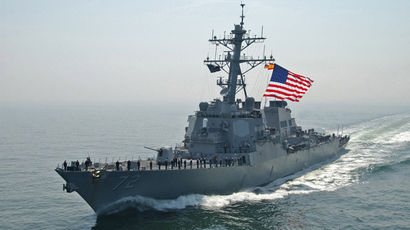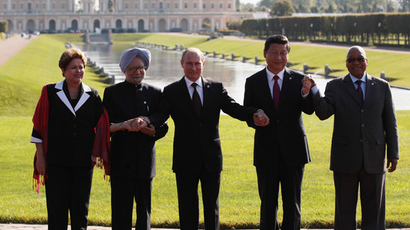3-day op: Reports that Pentagon aiming at heavier Syria strike

Despite stiff opposition at home and abroad to any military solution to the Syrian chemical weapons crisis, the Pentagon is preparing for a much broader attack on Syria than it originally had planned, the Los Angeles Times reports.
The revised plan calls for three-days of cruise missile attacks followed by a second wave of attacks on targets that the initial salvos failed to destroy, anonymous sources told the daily.
Two US officers also alleged that the White House “requested an expanded target list in recent days to include many more than the 50 or so targets on the initial list.”
Pentagon planners have several options in the event of an attack: they are pondering over calling in Air Force bombers to be backed by air-to-surface cruise missiles from five warships now on patrol in the eastern Mediterranean Sea, or use an aircraft carrier strike group in the Red Sea, which includes one cruiser and three destroyers.
"There will be several volleys and an assessment after each volley, but all within 72 hours and a clear indication when we are done," said one officer familiar with the planning.
The article admitted, however, that some military officers are skeptical that even a more robust air campaign will do much lasting damage to Assad’s forces. One of the officers told the Times that the planned operation amounted to little more than a temporary "show of force," not enough to turn the tables in favor of Syrian rebel forces.
Reports that the Syria target list was to be expanded first appeared during the G20 summit in St Petersburgh. Obama refuted the rumors at the press conference. US Secretary of State John Kerry suggested on Sunday that Washington might still bring the Syria strike issue to the UN Security Council, but that Obama is still keeping all options on the table.
"On President Hollande's comments with respect to the UN, the president [Obama], and all of us, are listening carefully to all of our friends," Kerry said. "No decision has been made by the president."
Obama has declined to say whether he would order an attack on Syria if Congress votes against military action. However, he did give a preview of his argument in his weekly radio address on Saturday.
"Failing to respond to this outrageous attack would increase the risk that chemical weapons could be used again, that they would fall into the hands of terrorists who might use them against us, and it would send a horrible signal to other nations that there would be no consequences for their use of these weapons," he said.
The US leader is planning an attack of a different sort as he prepares to appeal for public support in the coming days on the nation’s media including ABC, CBS and NBC, the three main broadcast networks, as well as CNN, PBS, and Fox News. He will also make a special address from the Oval Office on Tuesday - something all the channels will broadcast - the day before the Senate is expected to grant or reject authorization to a strike on Syria.
The world’s opinion remains divided on the Syrian action. In its latest remarks, the EU said the Syrian government was the likely perpetrator of the Damascus chemical attack, but that it will not be rushed into any military action before an official UN report is released.
Russia, China and several other countries insist that any action
taken on Syria should be first approved by the US Security
Council, with President Vladimir Putin calling the Ghouta
chemical incident a “provocation” on the part of the rebels and
pledging help to Syria in the event of a foreign attack.














